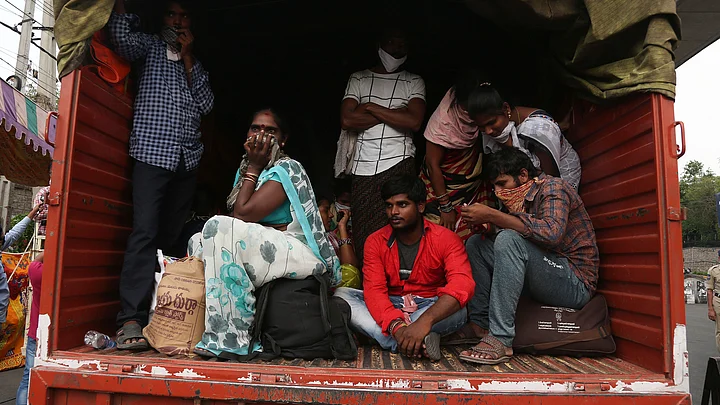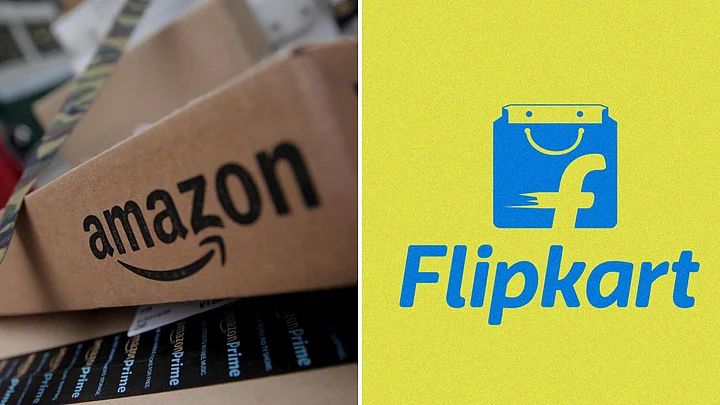1. Stranded Labour Can Work During Lockdown, But Conditions Apply
The Union government on Sunday said that workers stranded in relief camps could go to work within the states they were in but didn’t give permission to let them go back to their home states or allow any interstate movement.
The home ministry issued a “standard operating system for movement of stranded labour” to allow workers to resume work from 20 April when additional economic activities will begin in areas not designated as “containment zones”.
The government has said that migrant workers residing in relief camps in various states should be registered with the local authorities “and their skill-mapping be carried out to find out their suitability for various kinds of work”. “In the event...migrants wish to return to their place of work, within the state where they are presently located, they would be screened and those asymptomatic would be transported to their respective places of work,” the guidelines said.
(Source: The Business Standard)
2. Direct Benefit Transfer of Rs 36,659 Crore Since Beginning of Lockdown
Using the Public Financial Management System (PFMS) technology platform, more than Rs 36,659 crore has been transferred through direct benefit transfer (DBT) to the bank accounts of 16.01 crore beneficiaries since the start of the lockdown, in the wake of the outbreak of COVID-19, the Controller General of Accounts said on Sunday.
DBT payments by the Centre, between March 24 and April 17, under all the central sector/centrally-sponsored schemes, amounted to Rs 27,442 crore in schemes such as the PM-Kisan (Rs 17,733 crore), Mahatma Gandhi National Employment Guarantee Scheme (Rs 5,406 crore) and Indira Gandhi National Old Age Pension Scheme (Rs 999 crore). Additionally, states together made DBT payments of Rs 9,717 crore.
(Source: The Financial Express)
3. Oil Drops to 21-Year Low With Storage Filling as Demand Shrivels
Oil extended its slide, falling to the lowest in more than two decades, on concern the world is rapidly running out of places to store crude after output cuts proved insufficient to cope with plunging demand.
Futures in New York fell more than 8% in early Asian trading to less than $17 a barrel after losing almost a fifth of their value last week as the deal by OPEC+ and other producers failed to counter the loss of demand from a crippled global economy. The current May contract expires Tuesday, however, with the more active June futures only down by less than half as much.
Near-term prices for West Texas Intermediate, the U.S. benchmark, are trading at huge discounts to later-dated contracts on concern the storage hub of Cushing, Oklahoma, will fill to capacity. That has seen prices disconnect from Brent futures in London. Buyers in Texas are offering as little as $2 a barrel for some oil streams, raising the possibility that American producers may soon have to pay customers to take crude off their hands.
(Source: Livemint)
4. Govt Backtracks on Non-Essential Items' Sale By E-tailers
The government on Sunday said e-commerce platforms would be allowed to sell only essential items during the lockdown extension, a move that the industry described as a complete U-turn from what was said last week.
The decision marked a big win for small trader bodies, most notably the Confederation of All India Traders (CAIT), which wanted the government to reconsider its earlier decision to allow e-commerce firms to sell non-essential items.
In a letter to the Prime Minister, CAIT National Secretary General Praveen Khandelwal said allowing e-commerce firms to sell non-essentials when brick-and-mortar small traders were allowed to sell just essential items would be “unfair” and “create a further imbalance in the level playing field”.
(Source: The Business Standard)
5. Even the Best of Banks, Corporate India to Plumb New Depths
The best of India’s companies and banks are in a spot as the pandemic-related lockdown brings business to a halt. In an economy ravaged by pay cuts and lay-offs, experts expect financiers — both for consumer and corporate loans — to see delayed repayments and probably even defaults.
Even otherwise, consumption demand for large-ticket items like homes and high-priced durables is expected to remain anemic for the rest of the year while investments are likely to come to a complete standstill pressuring revenues and cash flows across India Inc. Corporate India’s finances already look far more stretched than they did even a month back.
At 21 downgrades a day between January and now, compared with 15 downgrades a day between January and mid-March, the deterioration in companies’ financial health has been rapid. The pain isn’t about to end anytime soon; Crisil believes downgrades will continue to outnumber upgrades in 2020-21 following the economic impact of the COVID-19 pandemic.
(Source: The Financial Express)
6. A Big Blow to Fuel Consumption in the Country Due to COVID-19
Here’s a round-up of an important coronavirus-related article from across Indian publications — from food shortage to farmers’ distress in Punjab and Haryana, and the economic impact of the 21-day lockdown.
A 2-km-long food queue in Delhi during peak afternoon: Hundreds of men and women mostly migrants lined up at Delhi’s Bhalswa where food was being distributed by a community health group called Shri Shiv Sevak Delhi Mahashakti Group. The heart-rending visuals captured by Scroll indicate that the government efforts to provide food and grains to the needy, especially the migrant working class, is short of adequate. Read more here
Lockdown cuts India fuel demand by 50 percent: India’s state-owned energy companies sold 50% less refined fuel in the first two weeks of April than the same time a year ago. India’s diesel sales by state retailers in the first 15 days of April dropped by 61% from a year earlier while petrol and jet fuel sales declined by 64% and 94%. State companies - Indian Oil Corp, Hindustan Petroleum Corp, and Bharat Petroleum - own about 90% of India’s retail fuel outlets. Read more here
(Source: The Business Standard)
7. Competition Commission Cautions Businesses Against Unfair Practices Amid Coronavirus Pandemic
India’s competition regulator has cautioned companies from taking advantage of the COVID-19 situation and engaging in anti-competitive practices but allowed for greater coordination in the critical sectors of healthcare and essential commodities and services.
The anti-trust watchdog said companies, even competitors, can share resources including distribution network and infrastructure, transport logistics and production without fear of adverse action or scrutiny as long as it results in increased efficiency and consumer welfare.
“Section 3 (3) of the Act presumes certain concerted actions between competitors to cause an appreciable adverse effect on competition. This presumption is not applicable to joint ventures if such agreements increase efficiency in production, supply, distribution, storage, acquisition or control of goods or provision of services,” the Competition Commission of India said in an advisory to businesses on Sunday.
(Source: The Economic Times)
8. RBI May Cap Reverse Repo Rate to Ensure Liquidity Translates Into Credit
The Reserve Bank of India (RBI) is not in favour of banks parking huge amounts of funds at its reverse repo window, and may not hesitate to impose a cap on it to ensure systemic liquidity translates into credit for the industry.
“While it is for the banks to decide whom they want to lend, it can’t be that they continue to park huge amounts at the reverse repo window,” said a source.
This is, in effect, the sharpest follow-up to RBI Governor Shaktikanta Das’ statement last Friday, drawing attention to the Rs 6.9 trillion being absorbed under its reverse repo operations, and a systemic liquidity surplus averaging Rs 4.36 trillion during March 27-April 14, 2020. And that the slash in the reverse repo rate by 25 basis points (bps) to 3.75 per cent “is to encourage banks to deploy these surplus funds in investments and loans in productive sectors of the economy”.
(Source: The Business Standard)
9. Only Half of India’s Household Consumption Will Come Through Post COVID
The ongoing discussion on the prognosis for consumer demand is currently based on extrapolations from supply-side data and macro-economic variables. This column aims to supplement it by providing household-level data on consumption, a “people-view" of those who cause this demand to happen.
India’s household consumer demand, the jewel in its gross domestic product (GDP) crown, is vulnerable and skittish because of dismal occupation demographics, lowly paid and uncertain livelihoods for most; and because most Indian households have very little “surplus income", money remaining after covering their routine expenditure, leave alone their non-routine requirements and emergencies. Consumer demand commentators have been generally reluctant to link the dismal occupation demographics to consumer demand, beyond monsoon-dependent agriculture and, after demonetization, small business owners and their employees.
The COVID-19 pandemic has forced us to acknowledge the universe of migrant—daily-wage workers—individual service providers who hunt for their daily bread, 32% of Indian households who contribute about 24% to India’s household expenditure. By contrast, the so-called middle class, which is actually India’s richest 20% of households, accounts for 36% of consumption expenditure.
(Source: Livemint)
(At The Quint, we question everything. Play an active role in shaping our journalism by becoming a member today.)





